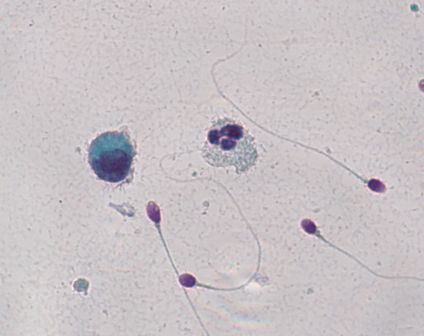
Pus cells are WBCs - white blood cells, and less than 5 pus cells / hpf is considered to be normal, but this finding is often highlighted in red as being abnormal, and this often causes both the doctor as well as the patient to worry.
The WHO Manual states that less than 1 million WBC per ml is normal, but the majority of labs never bother to measure the actual concentration of the WBCs - the technician simply eyeballs the sample and estimate this in terms of rounds cells seen in each visual field when scanning the samples through the microscope.
Patients are worried that these pus cells suggest they are suffering from an occult infection - perhaps a sexually transmitted disease ( STD) which they knew they had acquired in the past, and they are worried that they can transmit this to their wife.
They are also worried that this hidden infection can kill their sperm, or reduce their ability to fertilise the eggs.
Doctors are also happy to "treat" this abnormality by putting the man on antibiotics, because these are so easy to prescribe, and because this seems to be a logical thing to do. They hope these antibiotics will kill the bugs causing the infection, and this will boost the man's fertility.
The reason this is flawed logic is because the "pus cells" seen on a semen analysis report when checked through the microscope are simply round cells, which are misinterpreted as being pus cells .
When examining the semen under the microscope, it's very easy to identify sperm because they have a tail and are moving rapidly. However, seminal fluid also contains many other cells, including the epithelial cells which line the male reproductive tract, as well as sperm precursor cells.
Most laboratory technicians will report every round cell they see as a pus cell or a WBC , but most of these are actually immature sperm precursors, called spermatocytes or spermatogonia , which look exactly the same. However, most labs don't have the special stains needed to identify whether this round cell is a WBC or not , which is why they will report all the round cells as pus cells !
The doctor then promptly prescribes antibiotics, but this is a complete waste, because there was no infection in the first place, and antibiotics will not cause the sperm precursor cells to go away !
Patients end up wasting a lot of time and money on taking antibiotics . Some doctors will also send the semen sample to the microbiology lab to try to culture the microbe causing the purported infection. However, it's surprisingly difficult to culture the semen sample properly, because it's often contaminated with the commensals on the skin of the penis, such as E.coli , which causes further confusion !
The bottom line is if your semen report does show a few pus cells, please don't panic ! Please repeat it again, and ask the lab to do the special stains needed to check if these are actually WBCs.
Otherwise, your wife will keep on getting older and losing her fertility, while you waste time because of a poor quality laboratory, or a poorly informed gynecologist .
No comments:
Post a Comment